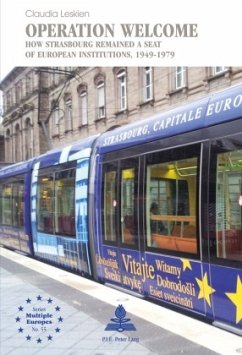An accepted narrative within European integration history is that the issue in which city to locate European Community headquarters was decided on the intergovernmental level between the member states. In the present volume, this view is expanded with the example of Strasbourg by arguing that activity at the local level is an important factor as well.
A set of highly active political and associational local agents used different strategies to consolidate the city's position against competing cities and the European Communities. This study finds that a highly specialised group of municipal politicians and civil servants were an important factor for bringing the European institutions to the city.
A set of highly active political and associational local agents used different strategies to consolidate the city's position against competing cities and the European Communities. This study finds that a highly specialised group of municipal politicians and civil servants were an important factor for bringing the European institutions to the city.








